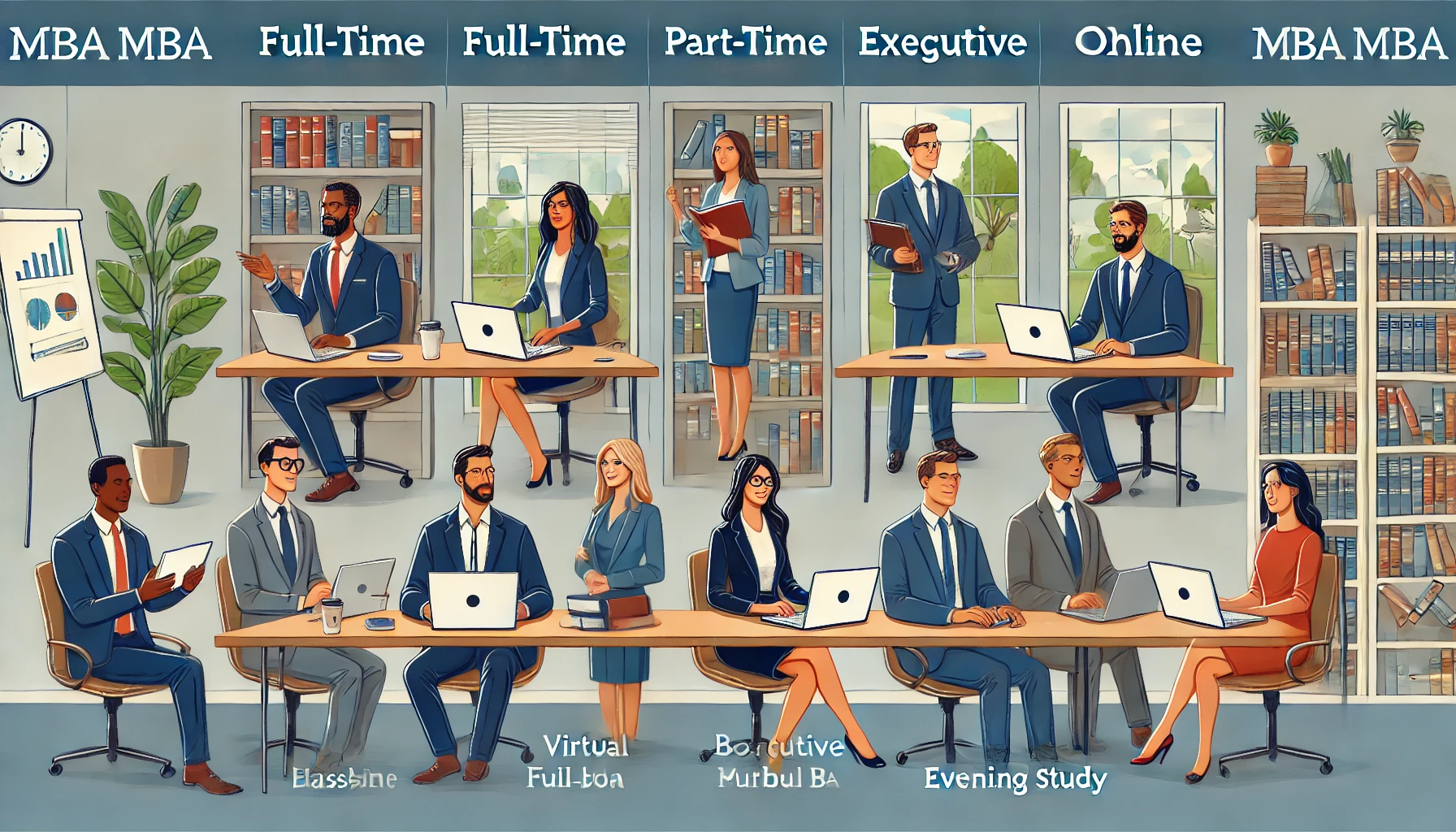Address
Fun Rush, [Erode], India
Work Hours
Monday to Friday: 7AM - 7PM


With so many MBA options available in 2025, choosing the right program can be overwhelming. Should you quit your job for a full-time MBA, balance work with a part-time MBA, fast-track leadership with an Executive MBA, or go fully remote with an Online MBA?
Each MBA format has its advantages and drawbacks, depending on your career goals, financial situation, and lifestyle. This guide will compare the four main MBA types, helping you determine which is the best fit for you, whether you’re considering an MBA in Finance, MBA in Marketing, MBA in Business Analytics, MBA in Human Resources, or MBA in Operations Management.
👤 Best for: Career changers, recent graduates, professionals with 3-7 years of experience
⏳ Duration: 1-2 years
💰 Cost: $50,000 – $150,000+
📍 Top Schools: Harvard, Stanford, INSEAD, Wharton
✅ Pros
✔ Career Acceleration: Higher salary growth and leadership opportunities post-MBA
✔ Immersive Experience: Focus entirely on coursework, networking, and extracurriculars
✔ Strong Alumni Network: Lifelong career connections and mentorship
✔ Internships & Career Switch: Gain hands-on experience in a new industry
❌ Cons
❌ Expensive: Tuition + living expenses can exceed $200,000
❌ Career Break: Requires quitting your job for 1-2 years
❌ Competitive Admissions: Top programs have acceptance rates below 15%
💡 Ideal for: Professionals looking for a complete career transformation into consulting, MBA in Finance, MBA in Marketing, or Business Analytics.
👤 Best for: Working professionals who want to upskill without leaving their job
⏳ Duration: 2-5 years (flexible schedule)
💰 Cost: $40,000 – $120,000
📍 Top Schools: Booth, Berkeley Haas, UCLA Anderson
✅ Pros
✔ Keep Your Salary: No need to quit your job while earning your MBA
✔ Apply Learning in Real-Time: Use MBA knowledge immediately in your workplace
✔ Lower Financial Burden: Often employer sponsorship opportunities
❌ Cons
❌ Takes Longer to Complete: Balancing work and study can be challenging
❌ Less Campus Immersion: Limited networking and campus engagement compared to full-time MBAs
❌ Fewer Internship Opportunities: Harder to switch industries without a dedicated internship
💡 Ideal for: Mid-career professionals looking to advance within their current company or industry, particularly in MBA in Human Resources, MBA in Operations Management, or Marketing.
👤 Best for: Senior managers, executives, and entrepreneurs with 10+ years of experience
⏳ Duration: 1-2 years (weekend or modular format)
💰 Cost: $80,000 – $200,000
📍 Top Schools: Wharton, MIT Sloan, London Business School
✅ Pros
✔ Designed for Leaders: Focuses on executive-level skills and global strategy
✔ Powerful Network: Connects with C-suite executives, entrepreneurs, and decision-makers
✔ Immediate ROI: Apply learnings in real-time at your company
❌ Cons
❌ Expensive: Often self-funded (though some companies offer sponsorship)
❌ Demanding Schedule: Requires balancing work, travel, and study
❌ Not Ideal for Career Switchers: Best suited for accelerating an existing career, not changing industries
💡 Ideal for: Senior professionals looking for C-suite roles, board positions, or leadership in global corporations, particularly those in MBA in Finance or Business Analytics.
👤 Best for: Professionals needing flexibility due to work, family, or location
⏳ Duration: 1-4 years (self-paced or structured)
💰 Cost: $10,000 – $80,000
📍 Top Schools: Indiana Kelley, Carnegie Mellon Tepper, Warwick Business School
✅ Pros
✔ Study from Anywhere: No need to relocate or leave your job
✔ Lower Cost: More affordable than traditional MBA programs
✔ Work-Life Balance: Learn at your own pace, making it great for parents or busy professionals
❌ Cons
❌ Limited Networking: Less in-person interaction with professors and peers
❌ Requires Self-Motivation: No fixed schedule means staying disciplined is crucial
❌ Fewer Campus Resources: Some companies may still favor traditional MBAs
💡 Ideal for: Professionals who need an MBA without disrupting their career or personal life, especially in MBA in Marketing, MBA in Human Resources, or Operations Management.
| Feature | Full-Time MBA | Part-Time MBA | Executive MBA | Online MBA |
| Best for | Career changers | Working professionals | Senior executives | Remote learners |
| Time Required | 1-2 years | 2-5 years | 1-2 years | 1-4 years |
| Cost | $$$$ | $$$ | $$$$ | $$ |
| Networking | ⭐⭐⭐⭐⭐ | ⭐⭐⭐ | ⭐⭐⭐⭐ | ⭐⭐ |
| Career Switch? | ✅ Yes | ❌ Limited | ❌ No | ❌ No |
| Work While Studying? | ❌ No | ✅ Yes | ✅ Yes | ✅ Yes |
🔹 Choose a Full-Time MBA if…
✔ You want a career switch or big salary jump
✔ You can afford a career break for 1-2 years
✔ You thrive in an immersive, campus-based learning environment
🔹 Choose a Part-Time MBA if…
✔ You want to grow within your current company
✔ You need to balance work and studies
✔ You prefer a lower financial burden
🔹 Choose an Executive MBA if…
✔ You’re a senior professional (10+ years of experience)
✔ You aim for C-suite or leadership roles
✔ You want a fast-track program for executives
🔹 Choose an Online MBA if…
✔ You need maximum flexibility (work, family, travel)
✔ You want an affordable alternative to traditional MBAs
✔ You’re comfortable with remote learning & networking
There is no “best” MBA—only the best MBA for YOU. 🎯
Before deciding, ask yourself:
✅ What is my career goal? (Leadership, industry switch, upskilling?)
✅ Can I afford to leave work? (Financially & professionally)
✅ How important is networking for my career?
By aligning your goals, finances, and learning style, you’ll find the MBA that best fits your future success. 🚀
Which MBA Are You Considering?
Drop a comment below and let’s discuss! ⬇️